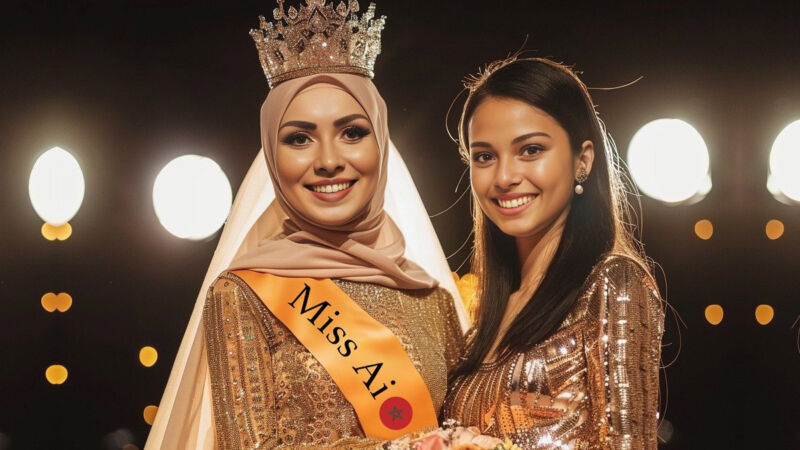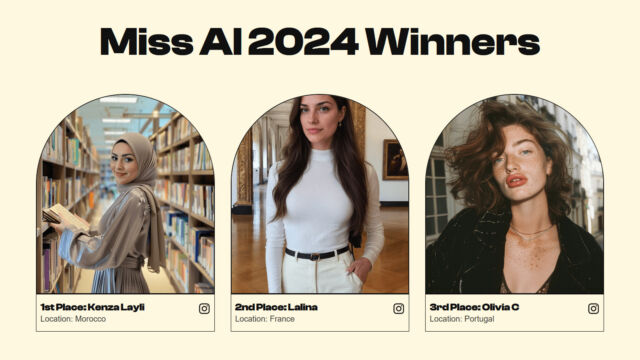
An influencer platform called Fanvue recently announced the results of its first “Miss AI” pageant, which sought to judge AI-generated social media influencers and also doubled as a convenient publicity stunt. The “winner” is a fictional Instagram influencer from Morocco named Kenza Layli with more than 200,000 followers, but the pageant is already attracting criticism from women in the AI space.
“Yet another stepping stone on the road to objectifying women with AI,” Hugging Face AI researcher Dr. Sasha Luccioni told Ars Technica. “As a woman working in this field, I’m unsurprised but disappointed.”
Instances of AI-generated Instagram influencers have reportedly been on the rise since freely available image synthesis tools like Stable Diffusion have made it easy to generate an unlimited quantity of provocative images of women on demand. And techniques like Dreambooth allow fine-tuning an AI model on a specific subject (including an AI-generated one) to place it in different settings.

Fanvue
The technology has attracted criticism since it emerged in 2022, so it’s not surprising that critics feel the “Miss AI” contest sets an unfortunate precedent and objectifies women. “In a field with such a glaring lack of gender diversity, it’s unsurprising that it has come to using AI generating images of what ideal women look like,” said Luccioni.
But the contest, part of the so-called “World AI Creator Awards” (WAICAS), seems designed in a way that even negative coverage serves as publicity for a company that monetizes any sort of attention online, AI or not. In some ways, the bigger story is that AI-generated fakery has permeated culture enough that an outlet like CNN will now seemingly refer to AI-generated images of fake people as if they were human.
In a CNN article titled, “The first Miss AI has been crowned — and she’s a Moroccan lifestyle influencer,” fashion journalist Jacqui Palumbo writes, “Meet Kenza Layli, a Moroccan lifestyle influencer who hopes to bring ‘diversity and inclusivity’ to the AI creator landscape. With nearly 200,000 Instagram followers, and a further 45,000 on TikTok, Layli is entirely AI-generated, from her images to her captions and buzzword-filled acceptance speech.”
-
A screenshot of the Instagram account for AI-generated influencer “Kenza Layli,” which won 1st place in the Miss AI contest. Captured July 11, 2024.
-
A screenshot of the Instagram account for AI-generated influencer “Lalina,” which won 2nd place in the Miss AI contest. Captured July 11, 2024.
-
A screenshot of the Instagram account for AI-generated influencer “Olivia C,” which won 3rd place in the Miss AI contest. Captured July 11, 2024.
-
A screenshot of an example Instagram image for AI-generated influencer “Kenza Layli,” which won 1st place in the Miss AI contest. Captured July 11, 2024.
-
A screenshot of an example Instagram image for AI-generated influencer “Lalina,” which won 2nd place in the Miss AI contest. Captured July 11, 2024.
-
A screenshot of an example Instagram image for AI-generated influencer “Olivia C,” which won 3rd place in the Miss AI contest. Captured July 11, 2024.
Of course, it’s impossible to meet Layli—she’s not real. Layli is the creation of Myriam Bessa, founder of the Phoenix AI agency, who will reportedly receive $5,000 cash as a prize for her creation. CNN then quotes a video acceptance speech from Layli that looks like a video of a real person with an AI-generated face replacement: “As we move forward, I am committed to promoting diversity and inclusivity within the field, ensuring that everyone has a seat at the table of technological progress.” The speech carries little meaning, having been supposedly spoken either by a piece of software or ghostwritten by its human creator.











![ROSE IN DA HOUSE I BE MY BOYFRIENDS 2 [OFFICIAL TRAILER]](https://cherumbu.com/wp-content/uploads/2022/01/ROSE-IN-DA-HOUSE-I-BE-MY-BOYFRIENDS-2-OFFICIAL-150x150.jpg)

